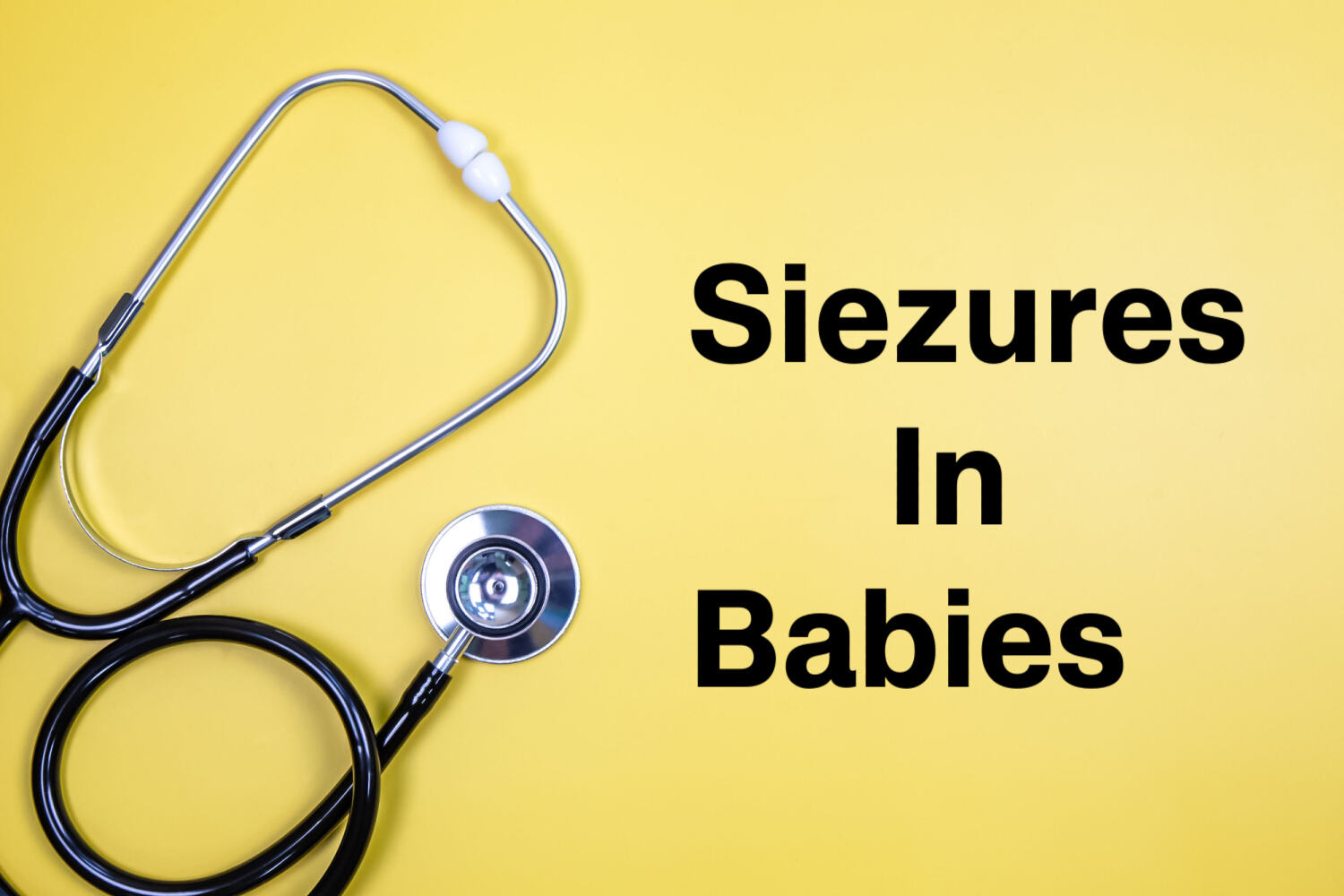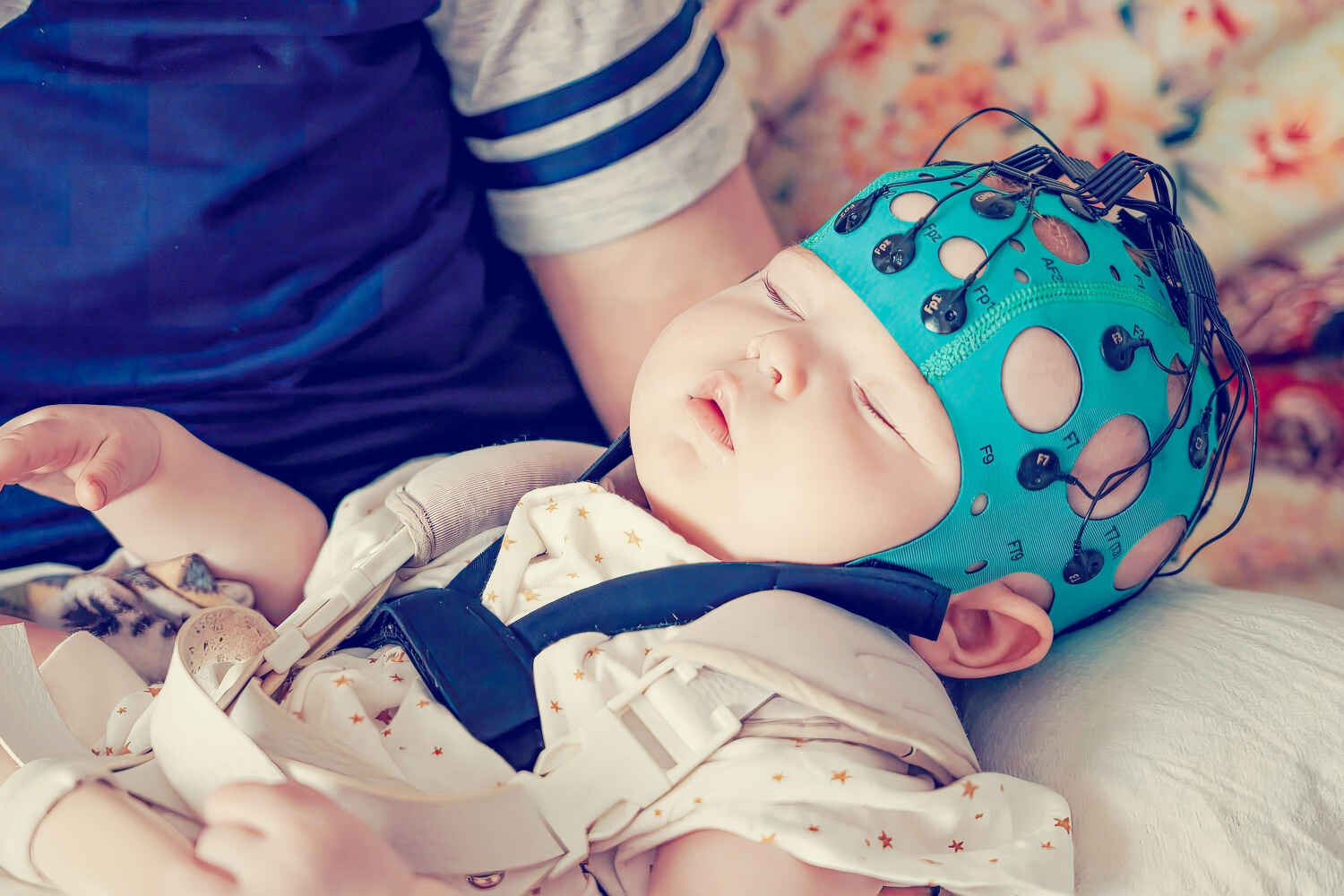
Have you ever seen a person having seizures? Have you noticed how uncontrolled those movements are and no one around can actually do anything to stop those jerky movements? People may use a lot of force and try to hold their limbs still but can you do that to a baby? Seizures in babies can be alarming for not just the parents but everyone around.
A newborn baby does not have much control over their limbs. Their movements are not coordinated. It is quite common to see them move their limbs suddenly with a jerk. However, what if those jerky movements continued? Is it normal? No, it could be seizures and it can become very serious if not attended to at the earliest.
In This Article
- What Are Seizures?
- Are Seizures Normal In Babies?
- Signs And Symptoms Of Seizures In Babies
- Causes Of Seizures In Babies
- Types Of Seizures In Infants
- How Are Seizures Diagnosed In Babies?
- How Can I Prevent My Baby From Having Seizures?
- Treatment Options For Seizures In Infants
- FAQ’s
What Are Seizures?
The brain cells communicate with one another to help us move various parts of our body in the way we desire. When there is a sudden surge in this communication, the body parts cannot react so quickly, leading to spastic or jerky movements called seizures. The body parts do not receive a clear signal and start moving vigorously. These seizures can last for a few minutes and may or may not happen again.
Are Seizures Normal In Babies?

No, seizures in babies are not normal. A seizure happens when there is a sudden burst of electrical activity between the brain cells in a baby. Such a sudden increase in activity can happen due to an injury, an infection, or an underlying health condition. These are not normal for a baby.
A seizure in a baby could be a neurological emergency. Such a neurological emergency is quite common in the first 4 weeks after birth. Some seizures may occur just once and may not last more than a few minutes. However, some seizures can be very frequent.
Frequent seizures can disrupt the oxygen supply to the baby’s brain frequently and may also lead to excessive activity in the brain. Such seizures require immediate treatment to ensure there is no lasting damage.
Signs And Symptoms Of Seizures In Babies
Since babies have random and jerky movements, it can be tricky to identify a seizure. Also, in some cases, the seizures may not last long enough for you to notice. A seizure can affect the entire body or just a part at a time. Let’s look at the symptoms shown by each body part.
- Eyes – Fluttering or blinking too much, random or rolling up, opens up wide and stares
- Mouth – Chewing, sucking, smacking lips and a protruding tongue
- Legs – Starts pedaling or bicycling unusually
- Body – Struggling or thrashing around. Muscles become stiff and tight or the whole body starts jerking.
- Limbs – One arm or leg stretches out stiff and can start jerking suddenly and quickly
- Head – Head or eyes turn to one side in tonic seizures.
- Breath – Sudden long pauses, also known as apnea.
- Others – Rhythmic jerky movements of the muscles in the face, arms, legs, tongue, or other parts of the body.
Causes Of Seizures In Babies

A seizure in a baby is due to abnormal activity in the brain. This can happen due to a brain injury or other health conditions. Some of the common causes of seizures in babies are
1. Brain Injury
Trauma or injury to the head during or after birth can lead to brain injury. Such injuries can also happen during birth when the doctor uses a vacuum or forceps to deliver the baby.
2. Infections
A severe bacterial infection like Group B strep or viral infections like encephalitis or even the flu can cause inflammations and seizures in the brain.
3. Increase In Body Temperature
A rise in the body temperature due to flu and fever can cause febrile seizures that last just a few minutes. These are common in young babies between the ages of 6 months and 5 years.
4. Fluid Build-Up
When fluid builds up in the brain (Hydrocephalus) without draining properly, it will increase the pressure on the brain and cause seizures. It can happen due to a head injury during or after birth.
5. Premature Birth
If the baby is born prematurely and is still very underdeveloped, it can lead to sudden electronic activity in the brain leading to seizures.
6. Cerebral Palsy
One of the common symptoms of cerebral palsy is seizures. The baby will not have enough control over their muscles, thus leading to seizures or jerky movements.
7. Drug Withdrawal
Babies born to mothers who are addicts (alcohol or other substances) can have neonatal seizures as a withdrawal symptom.
8. Genetics
Benign neonatal seizures happen on the fifth day and babies inherit them from the mother or father, who would have also had a similar seizure as a baby. It is also known as the fifth-day convulsions or fits.
9. Other Causes
Some of the other health issues that can lead to seizures in babies are – epilepsy, stroke, low blood sugar, brain bleeding, blood clots in the brain, or brain tumors. Seizures can occur when these issues become very serious.
Types Of Seizures In Infants
Different parts of the brain are responsible for activity in different parts of the body. Seizures can happen anywhere in the body. The different types of seizures in babies are
1. Focal Seizures
When the surge in electric activity in the brain happens in some specific area or side of the brain, it is a focal or partial seizure.
2. Atonic Seizures
These seizures may cause a sudden loss of muscle tone in the baby. As a result, the baby may go limp. They may suddenly drop their arms and head like a rag doll and become unresponsive.
3. General Tonic-Clonic Seizures
Also known as grand mall seizures, these happen in stages. First, the baby’s body and limbs will contract and straighten out, then the body will tremble and then the entire body will finally relax.
4. Absence Seizures
Absence seizures are short and last for about 20 to 30 seconds at a time. Also known as petit mal seizure, these are common among children in the 4-5 years group. During this seizure, the baby’s eyes suddenly open wide and become fixed for a few seconds. It can happen multiple times in a day and is easy to miss.
5. Febrile Seizures
High fevers trigger this seizure. It is not always a neurological issue but infants with brain damage are more prone to such seizures.
5. Infantile Spasms
These are newborn seizures that affect infants less than 6 months old. These are very rare and cause sudden spasms in the baby’s neck, body, or limbs. They can happen when the baby is waking up or is about to fall asleep and can happen many times a day. If left unattended, seizures in the newborn can have a very serious and long-lasting impact on the baby.
How Are Seizures Diagnosed In Babies?

When you notice your baby is making jerky movements very frequently or has a seizure, you need to consult a doctor immediately. The doctor will perform an EEG – Electroencephalogram, to measure the electrical activity happening in the brain. This test will reveal if the baby’s brain is having unusual electrical activity, which could be causing seizures.
The doctor will perform more than one EEG to get enough data to compare the brain activity during and between seizures.
If the EEG does not reveal much, the doctor might go for a CT scan or an MRI to check for structural changes or damage in the brain. An obstruction can also cause seizures in babies.
How Can I Prevent My Baby From Having Seizures?
Getting the right medical help and treatment at the earliest can prevent or reduce the chances of seizures from recurring. If the seizure cannot be completely stopped, the treatments can ensure there is no lasting damage to the child.
Once the medications and treatments start, ensure your baby takes the medications as prescribed without missing doses.
Treatment Options For Seizures In Infants
It is important to identify the cause of the seizure and treat it as soon as possible. The doctor may give Anticonvulsant medications under close supervision to ensure there are no adverse reactions. In case of loss of oxygen to the brain, the doctor might opt for hypothermia treatment. In this treatment, they will cool down the baby’s brain and slowly bring it up to normal temperature.
Seizures in babies are not very common yet not unheard of. While some seizures may just fade away, some may require close monitoring and treatment, to prevent any lasting impact. If your baby is suddenly unresponsive or shows signs of a seizure, it is important to consult a doctor right away.
FAQ’s
1. Do Seizures in Babies go Away?
It varies depending on the cause. If the seizure is during the neonatal stage and not very strong or recurrent in nature, it can go away as the baby grows.
2. At What Age do Seizures Start in Babies?
Seizures can start as early as 2 days after birth. These are neonatal seizures and require close observation of the babies.
3. Are Seizures Painful For Babies?
Seizures may not be painful but they can be scary and uncomfortable for babies. It can also be very tiring for the child, thus making them fussy and clingy.

